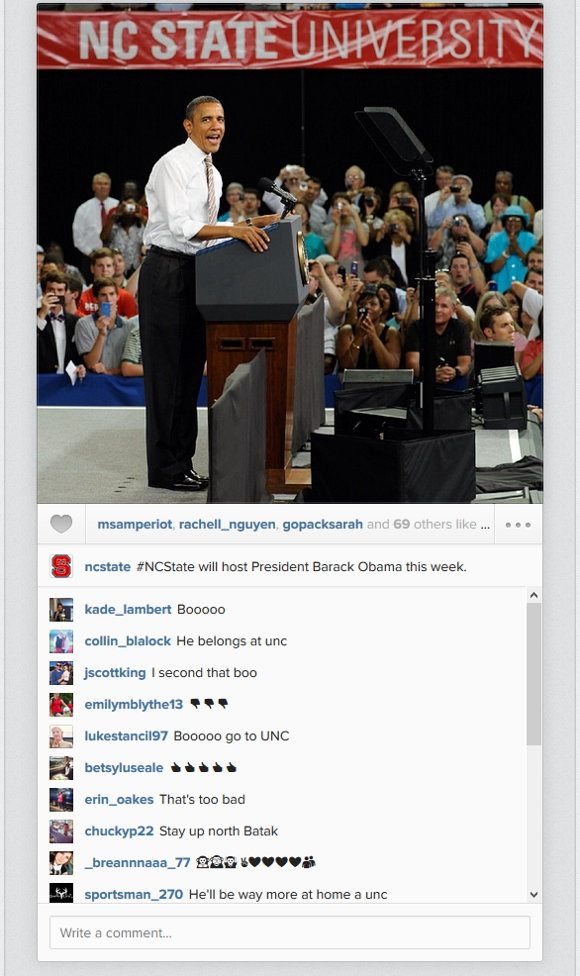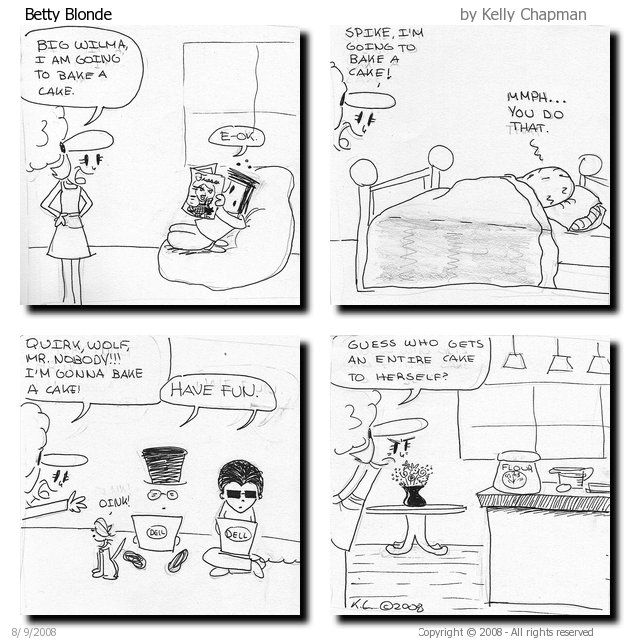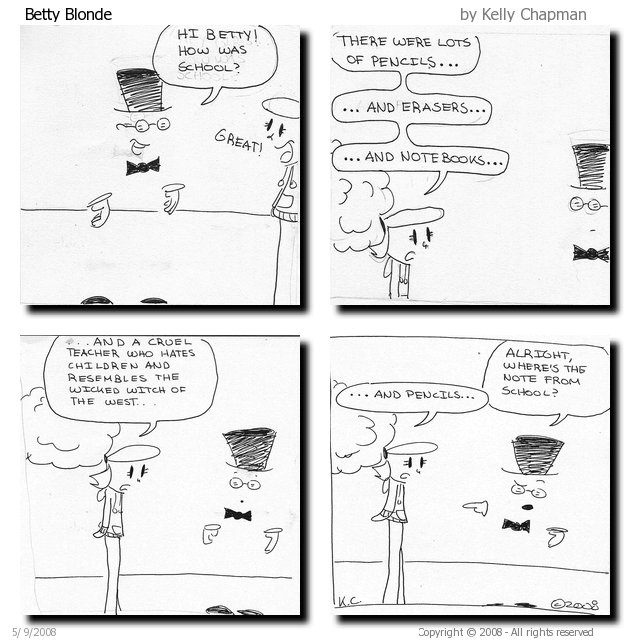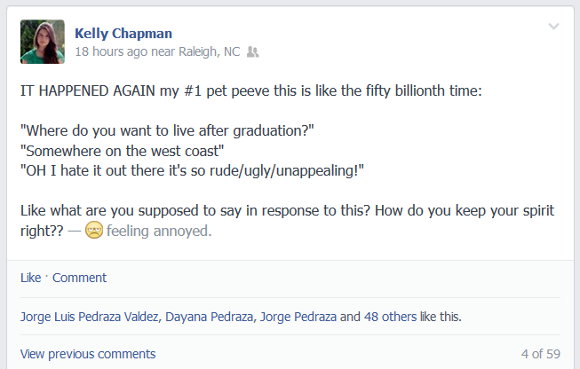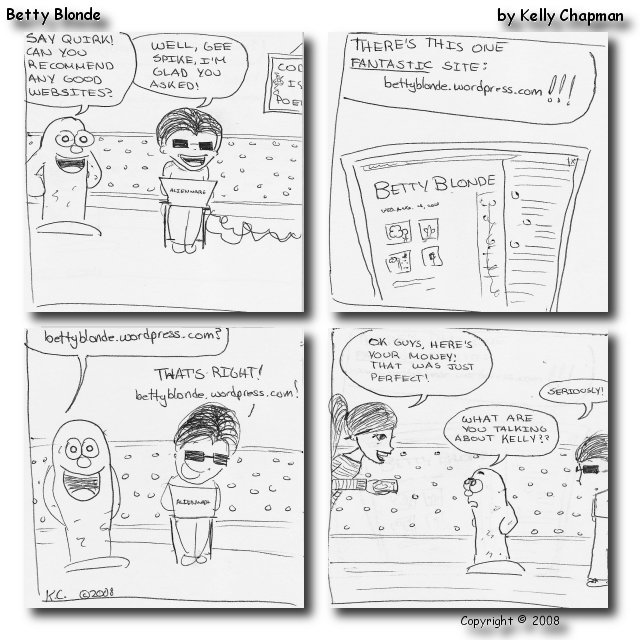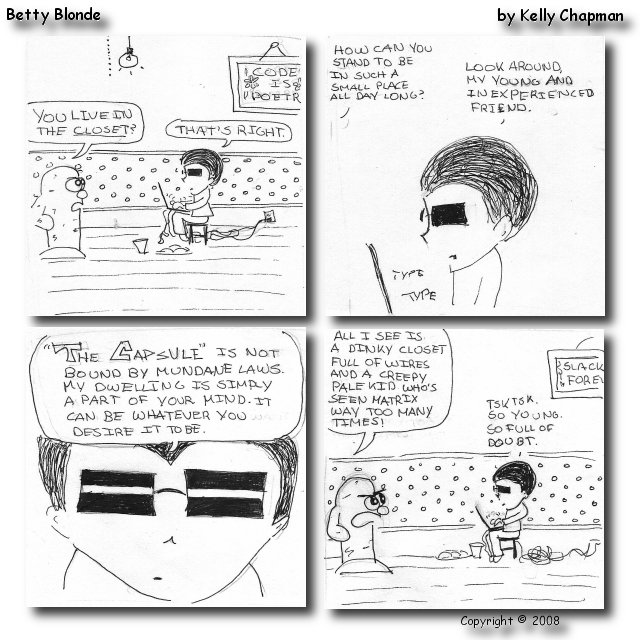Day 868 of 1000
Betty Blonde #34 – 09/02/2008

Click here or on the image to see full size strip.
Hello Kendra, Thanks again for the second set of great questions. Again, here is my best shot at the answers below.
(1) In answer to my first question you reply: In the case of the History and Biology, Kelly had already been through fairly rigorous, full year programs that covered the material at the Freshman or Sophomore year in high school. Was this one particular brand of curriculum or you the parent going beyond what the curriculum offered? I’ve read the posts describing your happiness with Sonlight. Is Sonlight that rigorous or did you augment the curriculum?
The answer to these questions differ, so I give you a three part answer with what happened with Kelly for Biology, U.S. History, and Western History. I should make a very special side note that the ability to pass these tests had as much to do with memorization skills as it did the understanding of the material.
- Biology — As part of the Sonlight program we used Apologia Biology. It took her an entire school year to complete that according to the Sonlight schedule. She almost certainly would have failed if she had only taken the CLEP exam without further preparation. Still, it was a fine introduction to Biology and completely adequate to prepare her to understand the material in the REA CLEP Biology preparation book. This one was a memorization meat grinder.
- History (Western Civilization 1 and 2) — The homeschool curriculum Kelly used to prepare to engage with the REA prep books for these two tests. this was, again, a bit of a memorization grind, but not impossible.
- History (U.S. History 1 and 2) We loved Sonlight’s programs, but felt their worst program by far was their U.S. History program. I have written about that in some detail. Kelly followed the program, but then we actually re-did U.S. History with something we put together ourselves that we felt was absolutely stellar in preparing her to engage with the REA prep books. One more time, there was a lot of memorization involved.
(2) In Texas, there are no regulations requiring me to test my children. I do plan to have them take the SAT and ACT. Are there other tests you suggest? And do you know if there is an age limit for these tests? Provided a student earns a score high enough for college enrollment, is the college required to allow that student to enroll regardless of their age?
We have very good friends in McKinney, Texas who followed a very similar program as our own with the exception that they took no CLEP tests. During the last two years of what would have been their high school, they enrolled in a community college that was extremely supportive of homeschool students. Unlike us, they did what might be considered a dual-enrollment program. They finished “high school” with two years of college credit. They have just finished their first semester at UT Dallas in Engineering and Pre-medicine. Both of them main 4.0 GPA’s and received quite good scholarships. I think the answer to this test depends both on the community college where you want to enroll them and whether you enroll them full time or under a special program. I think the kids need the ACT or SAT if they want to enroll full time, but probably not if they are in one of the special programs that cater to homeschoolers and public/private school dual enrollment kids. Normally, when kids enter a community college, they are tested for placement into Math and/or English, but that depends on the community college.
I know our friends were tied into the homeschool community in their area and used a homeschool consultant who was a tremendous help. I do not know whether or not they paid the consultant anything, but if they did, I doubt if it was very much. The consultant knew a lot about college requirements at the community and four year college level, how to best get scholarships in these kinds of situations, and stuff particular to Texas. I guess there are some pitfalls in with respect to scholarships in Texas if you do not do things in the right order–there certainly are in North Carolina.
(3) I viewed the Duke TIP website earlier. I do not see how you register your child for this. Will you give advice on that?
The Duke TIP test is either the ACT or the SAT and it is given to qualifying seventh graders in the Southern states including Texas. If you do not have a student in the seventh grade, I do not think I would bother. Here is the link to the sign-up page. Actually, the ONLY thing the Duke TIP thing did for us was get the kids into taking the test every year. Because Christian qualified for the test, we had both the kids take it together and it helped us realize they were ready for college. I think it was a big confidence builder in helping us to decide to go ahead and put them in college.
(4) Question 4 above regarding high school transcripts – you write you created a transcript for Christian after his 8th grade year. I’m thinking of a traditional high school transcript including Geometry, Algebra II, etc. Had he already taken those courses by 8th grade?
Christian had taken math about half way through Precalculus, Biology, Chemistry, and all the stuff that would be required for a high school transcript. When I made up the transcripts, I used material he learned in 7th and 8th grade and even earlier as high school credit. Fortunately, we kept very detailed records of all of our homeschool programs and their results, so this was fairly easy. There are lots of examples of how to do this online. The kids wrote footnoted research papers from the time Christian was in the third grade and Kelly was in fifth grade. I have links to them here. They transcripts were very well received by the community college. I think the kids test scores gave them credibility. I adjusted the transcripts some when they went to NCSU. They were well received there, too.
(5) I’ve read your children had good experiences sharing a college class and meeting new people. Did they ever experience negative attitudes from college teachers or other students?
Christian is fairly quiet and Kelly is very outgoing. The say they were pretty scared when they started community college, but were used to talking to adults when they got there, even though a lot of the people at community college were pretty immature. Almost without exception, the instructors and students treated them very well. They made friends with a wide range of different people from the community college and stay in touch with about seven or eight of them even now that they have been out for over a year and a half. Some of the stand-outs include an Iraq war vet who was 28 years old when he met them, a couple of kids from Venezuela, a lot of people starting at the community college to save money or to start over, etc. They also stay in touch with their Math instructor who was a mentor to them. One thing that worked in their favor is that when the students and teachers found out that they were humble and worked hard, they kind of got adopted. All in all, the vast majority of the people at the school, teachers, students, and administrators, were very, very supportive of the kids. It was a little harder when they got to NCSU because they entered there as Juniors, but still were required to go to Freshman orientation. The incoming Freshmen we dramatically less mature than the kids, mostly engineering, math, and science majors, who were generally paying for their own education at the community college. The administration and professors at NCSU have been very good to our kids and they have prospered socially as well as academically.
(6) Do you have any experience with any nationally recognized homeschool honor society or homeschool co-op?
We did not participate in homeschool co-ops or honor societies. It did not appear to hurt us at all. If we had to do it over, we would find some ways to do more structured volunteer work that would help the kids college applications, but that is about the only thing we might have done differently. We participated extensively in organized sports and music–swimming, gymnastics, soccer, piano, guitar, etc. Our friends in Texas did it a little differently. They participated in organized volunteer activities, job following, peer court (acting as judges and lawyers in a formal court setting), Youth Symphony, and lots of stuff like that. Things like Red Cross certifications (CPR, Life guarding, etc.) were also good. We participated extensively in church activities. I think because of their increased participation in organized community activities they were able to get better scholarships than our kids.
(7) In your experience, did either college want to know if your children did any community service? My area has a few homeschool co-ops. The main purpose seems to be to have someone else teach your children a subject you are not comfortable teaching as well as providing your child a place to earn some community hours. The flip side is you must pay dues and attend meetings to each one of these organizations – extra time and money.
Documented community service would be quite a good thing. I think it is pretty important when it comes to scholarships. We taught all the materials ourselves. Sometimes that was an excuse for me to learn new material myself–it was particularly educational and fund in the area of Art.
 Christian received the first response to his PhD applications yesterday from Arizona State University. They want to fly him out Tempe for “Recruiting Event” so he can talk to Electrical Engineering faculty and see the campus. They will put him up in a nice hotel and wine him and dine him a little. We are not sure whether he will go to ASU, but he will plan to go fly out to Tempe for this event if it does not conflict with another invitation–we hope he gets one or two more, but who knows? Here are a few tidbits from the letter.
Christian received the first response to his PhD applications yesterday from Arizona State University. They want to fly him out Tempe for “Recruiting Event” so he can talk to Electrical Engineering faculty and see the campus. They will put him up in a nice hotel and wine him and dine him a little. We are not sure whether he will go to ASU, but he will plan to go fly out to Tempe for this event if it does not conflict with another invitation–we hope he gets one or two more, but who knows? Here are a few tidbits from the letter.


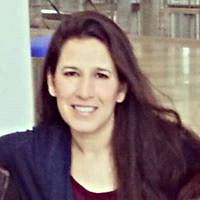 My wife’s birthday is today. She has now lived in the United States longer than she has lived in the country of her birth. Lorena’s English has improved pretty dramatically since she got her even though we still speak mostly Spanish at home. When I retire, we might head back to live in Mexico at least part of the year, but she is pretty much 100% assimilated now, so it leaves us a little conflicted. I hit the lottery when we got married. After 21 years of marriage, two kids, several cross country moves, and a lot of putting up with a husband on the road she just keeps getting better.
My wife’s birthday is today. She has now lived in the United States longer than she has lived in the country of her birth. Lorena’s English has improved pretty dramatically since she got her even though we still speak mostly Spanish at home. When I retire, we might head back to live in Mexico at least part of the year, but she is pretty much 100% assimilated now, so it leaves us a little conflicted. I hit the lottery when we got married. After 21 years of marriage, two kids, several cross country moves, and a lot of putting up with a husband on the road she just keeps getting better.

